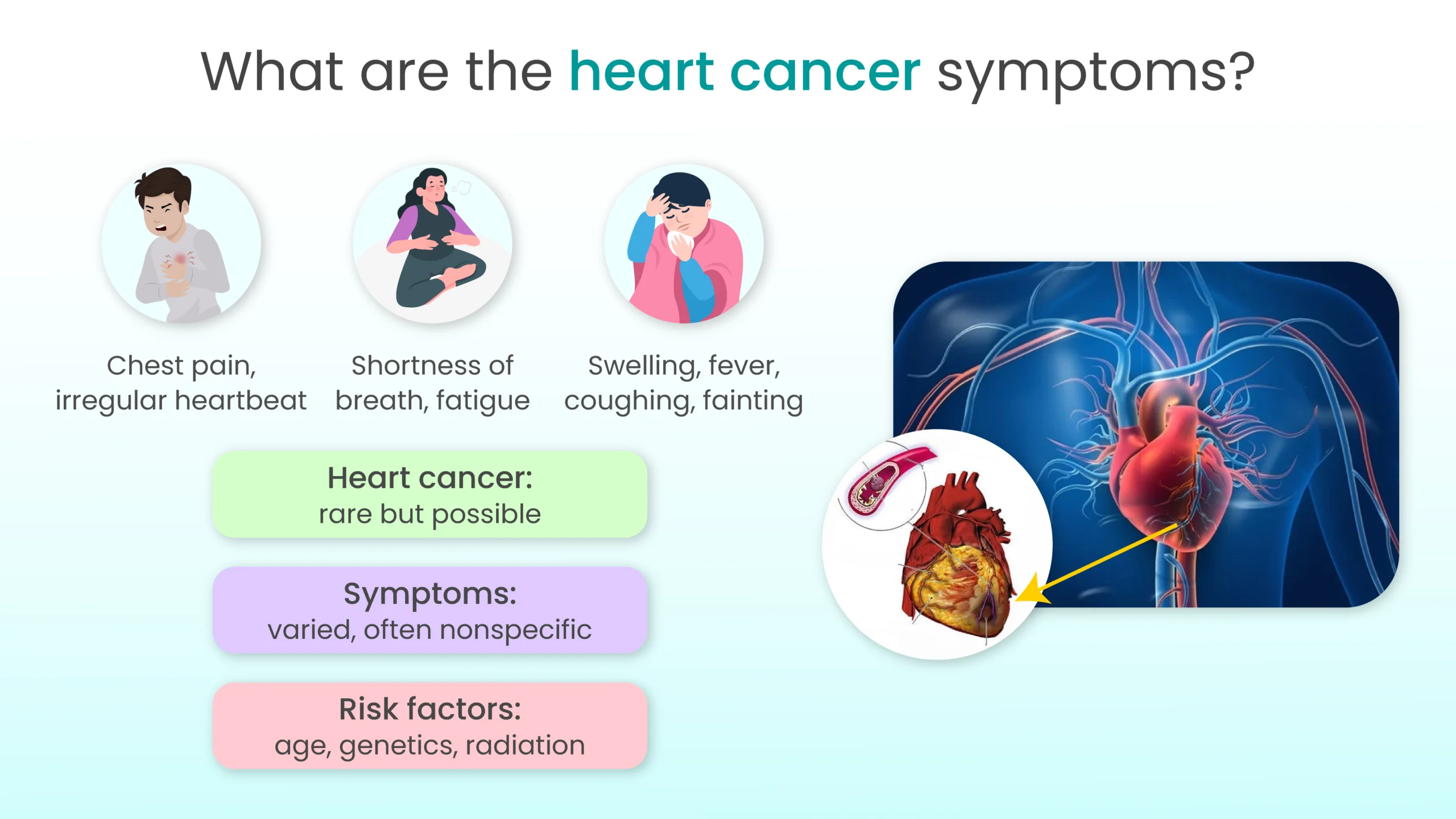
Author:- Mr. Ritesh Sharma
When you hear the word ‘cancer’, the heart is the last organ you associate it with. The cancer is normally related to organs such as the lungs, colon, etc. However, even if the rarest rare, heart cancer can exist, so, naturally, there must be some heart cancer symptoms that you must be aware of. Being aware of heart cancer symptoms will help you make aware of the treatment strategies and you can adopt early prevention.
Now, one question must be coming to your mind that what are the heart cancer symptoms that you need to know about? In this blog, we will cover all the heart cancer symptoms, i.e. all the symptoms that are linked to the rare condition of heart cancer. Apart from this, we will also talk about the risk factors of heart cancer as well as treatment and diagnosis methods. So, if you are perplexed after hearing about heart cancer, this blog will make you aware of it in all of its complexities.
What is heart cancer?
As baffling as it sounds, heart cancer is actually within the realm of possibility in cardiovascular diseases. Heart cancer, also known as cardiac tumor, occurs when abnormal cells grow uncontrollably within the heart tissue. These tumors can be either benign (non-cancerous) or malignant (cancerous). Malignant heart tumors are rarer and can either originate in the heart (primary tumors) or spread from other parts of the body (secondary or metastatic tumors).
Heart Cancer Symptoms
Now, let’s discuss the heart cancer symptoms in detail. These symptoms range from chest pain to cardiac arrhythmias to fainting and dizziness. The following is an elaborate explanation of all these symptoms:
- Chest Pain: Persistent chest pain can be a symptom of heart cancer. This pain may worsen over time and may not be relieved by rest or medication.
- Irregular Heartbeat (Arrhythmia): Heart tumors can disrupt the heart’s electrical system, leading to irregular heartbeats i.e. arrhythmias belonging to different arrhythmia classifications or heart palpitations . Arrhythmias can manifest as a racing heart, fluttering sensations, or skipped beats.
- Shortness of Breath: As tumors grow larger, they can obstruct blood flow within the heart chambers, leading to symptoms of heart failure such as shortness of breath, especially during physical activity or when lying down.
- Fatigue: Persistent fatigue or weakness can be indicative of heart cancer, as the heart’s ability to pump blood effectively becomes compromised.
- Swelling (Edema): Tumors in the heart can interfere with blood circulation, causing fluid buildup in the legs, ankles, abdomen, or other parts of the body.
- Fever: Some individuals with heart cancer may experience unexplained fever, which could indicate an inflammatory response to the presence of cancerous cells.
- Coughing or Wheezing: Tumors located in the upper chambers of the heart (atria) may cause symptoms similar to those of respiratory conditions, such as coughing, wheezing, or coughing up blood.
- Fainting or Dizziness: Reduced blood flow to the brain due to heart tumors can lead to episodes of fainting or dizziness.
Risk Factors of Heart Cancer
While heart cancer is extremely rare and heart cancer symptoms are even rarer, there are some risk factors associated with it. Let’s learn about all these risk factors below in detail:
- Age: Heart cancer is more common in adults, particularly those over the age of 50.
- Genetic Conditions: Certain genetic syndromes, such as Li-Fraumeni syndrome and tuberous sclerosis, are associated with an increased risk of developing heart tumors.
- Radiation Therapy: Previous radiation therapy to the chest area for conditions such as breast cancer may increase the risk of developing heart tumors later in life.
- Chemical Exposure: Exposure to certain chemicals, such as vinyl chloride or arsenic, has been linked to an increased risk of heart cancer.
- Pre-existing Heart Conditions: Individuals with pre-existing heart conditions, such as cardiac myxomas or certain congenital heart defects, may have a higher risk of developing heart cancer.
Diagnosis and Treatment
Since heart cancer and heart cancer symptoms are extremely rare, it is very tricky to diagnose it effectively. However, if you still somehow suspect that you have heart cancer, then it can be diagnosed by the following methods:
- Imaging Studies: Imaging tests such as echocardiography, MRI, CT scan, or PET scan can help visualize abnormalities within the heart. Preceding these tests, healthcare professionals can also perform an ECG (electrocardiogram) test and move further with diagnosis if the patient has an abnormal ECG.
- Biopsy: A biopsy involves taking a small tissue sample from the heart to examine it under a microscope for the presence of cancerous cells.
- Blood Tests: Blood tests may be conducted to assess for biomarkers associated with heart cancer.
Treatment options for heart cancer depend on various factors, including the type, size, and location of the tumor, as well as the individual’s overall health. Treatment may include surgery to remove the tumor, radiation therapy, chemotherapy, targeted therapy, or a combination of these approaches.
In conclusion, heart cancer is an extremely rare condition that very hardly occurs in people. However, there are heart cancer symptoms that are indicative of this condition. It is important for people to identify these symptoms and promptly adopt investigative measures for them to get heart cancer diagnosed. Furthermore, after heart cancer is diagnosed, patients must adopt the correct treatment method suggested by the healthcare professional and be vigilant for the future by adopting preventive measures, such as lifestyle modifications, quitting bad habits like smoking, taking alcohol in moderation, etc.
This will not only ensure that you steer clear of heart cancer but also protect you against all kinds of cardiovascular conditions. Stay smart, stay vigilant, and stay heart-healthy.



